Finding Strength Through Lymphoma
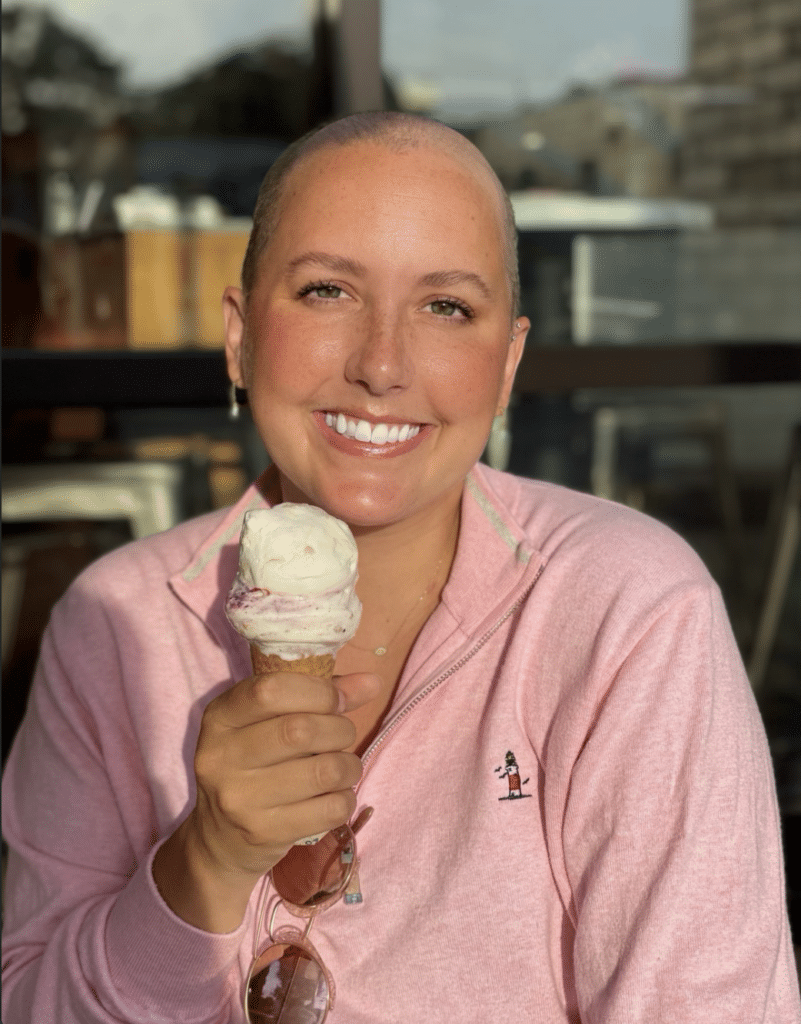
In June of 2022, Carly Stafford Dixon, a 30-year-old high school college counselor from Nashville, TN, was thrilled to be getting married to her fiancé (now husband), Wil, and beginning their lives together as a married couple. However, when Carly was unexpectedly diagnosed with lymphoma shortly after they said “I do,” their lives took a turn neither one of them was prepared for.
Carly and Wil were excited to finally be getting married after a long engagement due to COVID-19. After celebrating their nuptials with family and friends, the couple began searching for their first home and planning their future. Everything seemed to be falling into place.
In August, just two months after their wedding, Carly went on a fall outdoor retreat with her students and started feeling out of breath while taking them on a hike. Having grown up in Colorado and hiking her whole life, this was certainly unusual for her.
“The school I work for conducts an annual student retreat every fall for a few days of hiking, bonding, and outdoorsy stuff,” said Carly. “I was leading the hiking portion of the retreat and found myself feeling so winded on those trails, which is not like me – I had no idea what was going on.”
Carly’s first thought was that she might have COVID, but the tests all came back negative. She returned home from the retreat and flew to Colorado that weekend for a friend’s wedding. Again, she found herself short of breath and having difficulty breathing.
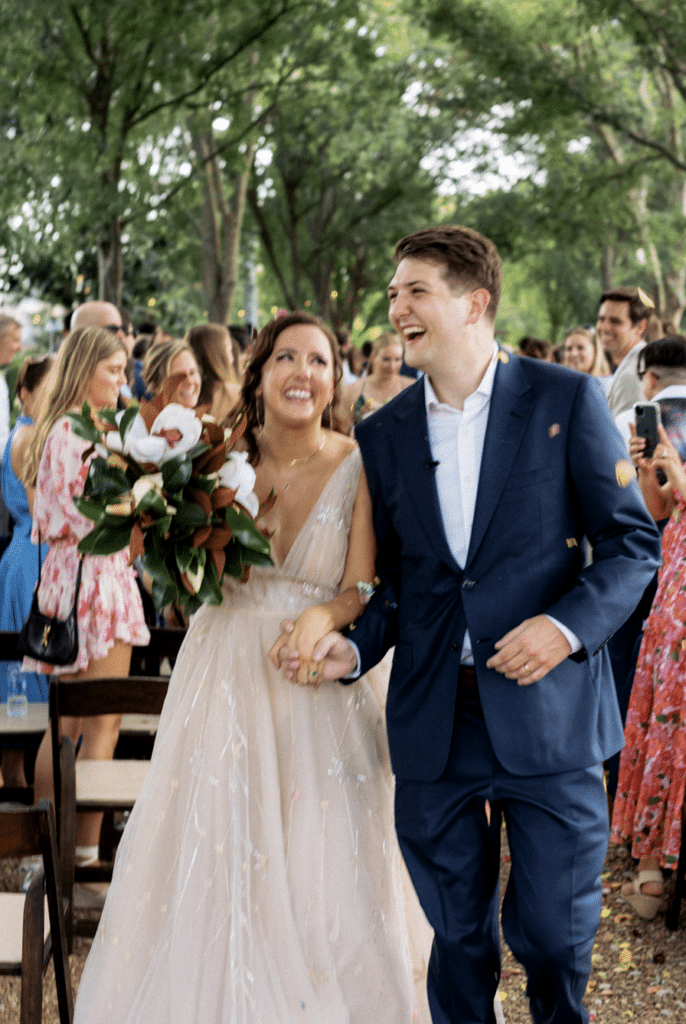
“I wondered if I might just be out of shape, but when I returned home, I was still feeling crummy and had to take the week off work to recover,” said Carly. I had planned to return to Colorado again over Labor Day weekend, but we canceled at the last minute because I was still feeling so ill.”
Not wanting to take any chances, she decided to see a doctor, but the only place open Labor Day weekend was an urgent care facility at a local drugstore. The doctor on staff there examined Carly and sent her to get an X-ray. The X-ray showed a large shadow in Carly’s chest, and she was immediately referred to get a CT scan. The CT scan confirmed that Carly had a large mass, at least six inches in diameter, lodged in her thorax (her upper chest) that was pressing on her lungs and making it difficult for her to breathe.
The urgent care facility instructed her to wait for a referral to a pulmonologist, but a family friend in medicine urged her to go to the emergency room immediately. Carly went to the emergency room with her husband on September 9, where she underwent a battery of tests.
“I was a bit scared in the beginning, but we felt we needed to be realistic about what they might find because we knew that a tumor that big could never be a good thing,” said Carly. “Thankfully, my family kept me occupied, and since I was running from test to test, I barely had time to worry.”
Receiving a Diagnosis
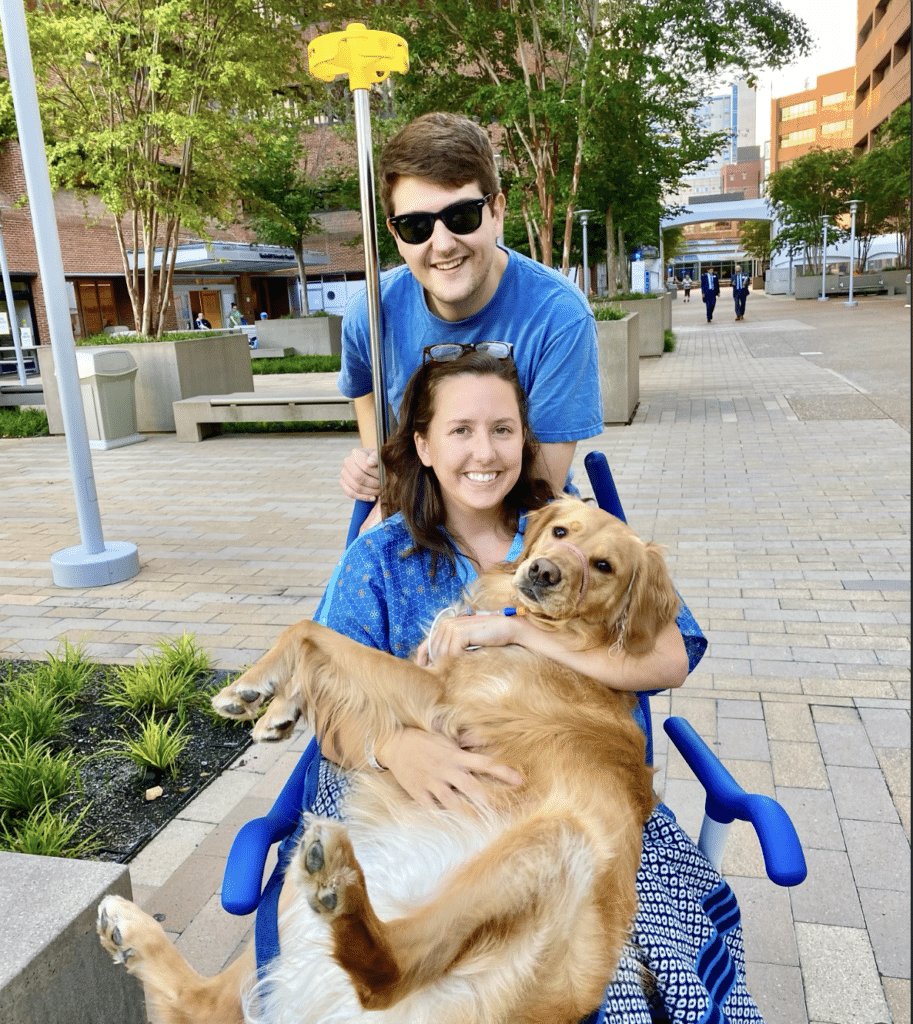
On September 13, after being cooped up in the hospital for four days awaiting test results, Carly just wanted to be outside and see her dog, Maggie. After receiving special permission to venture into the hospital courtyard, her mom wheeled her outside, IV pole in tow, where she was met by her husband and her dog Maggie at his side.
Coincidentally, the doctor handling Carly’s case called with biopsy results while they were in the courtyard and said that he would meet them there to talk. There, in the hospital courtyard, he gave Carly, her mom, and her husband the diagnosis: primary mediastinal B-cell lymphoma (PMBCL), an extremely rare form of non- Hodgkin lymphoma, primarily affecting women aged 25 to 40 for no known reason.
“Despite the news, it just felt good to have an answer – to know what was going on, that they had seen this before, and that there was something to be done about it,” said Carly. “For some reason, I wanted to get a picture before we went back into the hospital, so we have this picture that my mom took of me, my husband, and my dog. We’re all smiling in the picture despite having received some very bad news, but I remember thinking, ‘So that’s the last picture we’ll have together before my treatment starts.’”
Naturally curious and solution-oriented, Carly immediately went into discovery mode. She started asking her doctor as many questions as she could regarding treatment options, side effects, what to expect, and the road ahead. Along with her healthcare team, Carly decided that the chemo regimen called R-EPOCH would be the best for her. Carly moved into a new hospital room that night and started treatment the next day on September 14.
Special Considerations
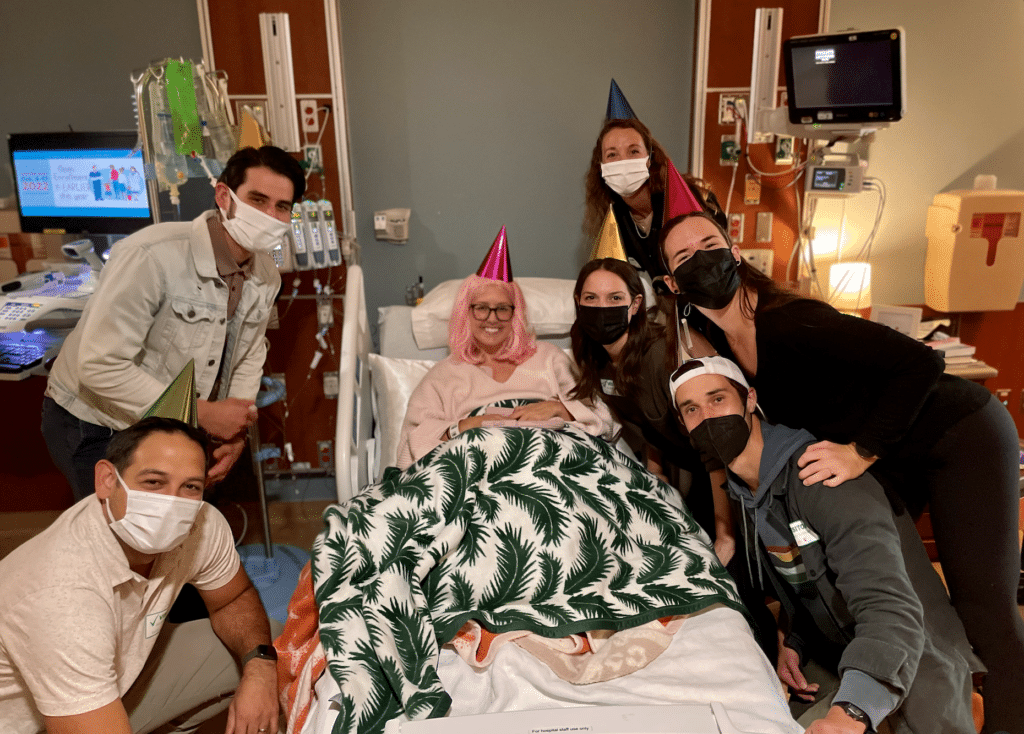
As a young adult diagnosed with lymphoma, Carly had some unique concerns that impact many other adolescents and young adults who are facing a cancer diagnosis. Being a 28-year-old newlywed, her first concern was surrounding her fertility.
“I was interested in pursuing fertility preservation, and one of the most difficult pieces of news I received was that we didn’t have enough time to freeze my eggs prior to starting treatment due to the fast-growing nature of the mass in my chest,” explained Carly. “Sometimes I find myself thinking that if I had not been diagnosed with cancer, we might be a few steps ahead in the family planning process compared to now, but I try not to dwell on it.”
Another concern for her centered around her professional life. How should she share this news with her boss? Would she be able to keep her job? How would her lymphoma diagnosis affect her career?
“Even though I’m fortunate to work in a supportive environment, I was still nervous about sharing my diagnosis with my boss,” said Carly. “I was worried about job security and about my own professional growth, but I knew I wouldn’t be able to work while receiving treatment.”
Luckily, her co-workers were incredibly supportive, making it clear that her recovery was the most important thing and that her job would be waiting for her when she finished her treatment.
Three Phases of Treatment
Carly’s first line of treatment consisted of six rounds of inpatient chemotherapy lasting five days and five nights each (120 hours of chemo per round), followed by two weeks off, over the course of four months. While her first-line treatment made a significant impact, it didn’t fully eradicate the tumor, and Carly required additional treatment. Her doctors suggested she undergo an immunotherapy approach called chimeric antigen receptor (CAR) T-cell therapy. CAR T uses patients’ own immune cells to treat their cancer.
She underwent two shorter stints of chemo before receiving CAR T in the summer of 2023. The treatment worked exactly as intended, and she was able to return to work cancer-free in the late summer of 2023.
“I’m so fortunate to have an amazing family, friends, and colleagues who supported me throughout this process,” said Carly. “My parents and two sisters came out to visit often, and they coordinated a calendar of friends and family to take care of me between rounds of chemo so that I was never alone. My husband, in-laws, colleagues, friends, and community here in Nashville were all fantastic and helped keep my spirits up.”
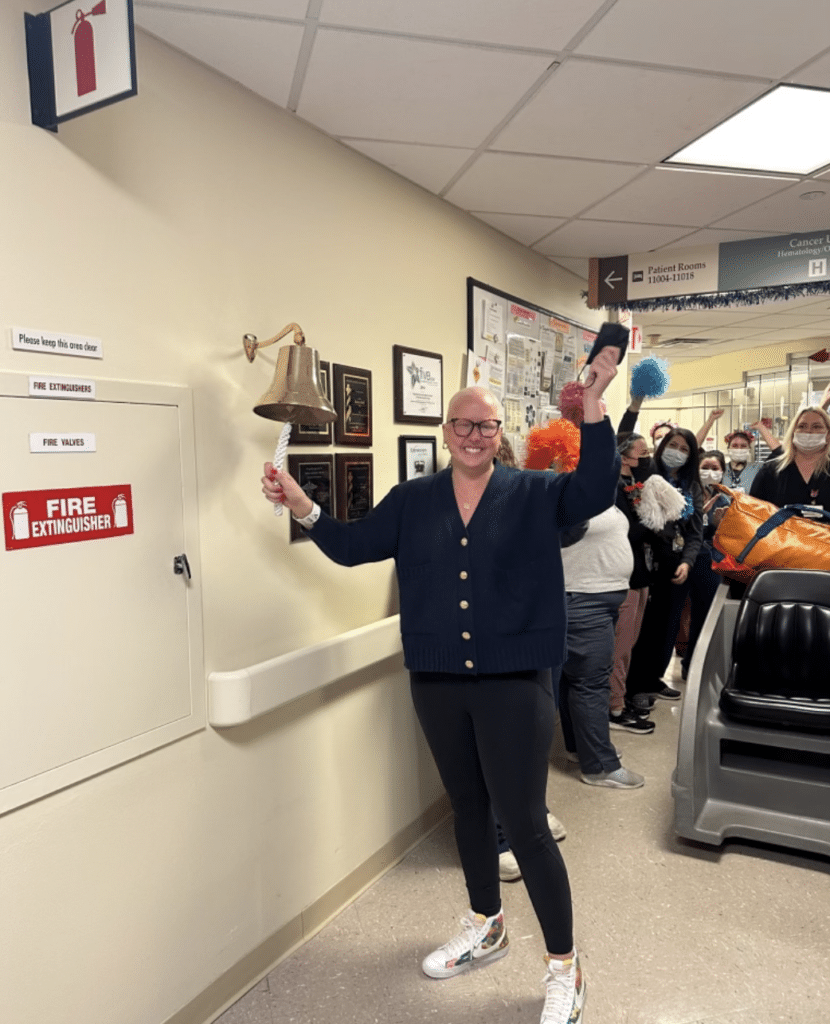
Discovering the Lymphoma Research Foundation
In her effort to learn more about lymphoma and her subtype, Carly found the Lymphoma Research Foundation website and dove into the Foundation’s rich resources.
“I first came across the Lymphoma Research Foundation when I was about to start CAR T,” explained Carly. “I found a lot of really helpful resources on the Foundation’s website, and after finishing treatment, I wanted to support the great research that the Foundation was helping to fund.”
In early September of 2023, shortly after finishing CAR T, Carly pursued a longtime personal goal and ran the Great Smoky Mountain Half Marathon in support of the Lymphoma Research Foundation. Carly was so successful in her fundraising that she was a finalist for the Rookie of the Year Award at the Foundation’s annual Fundraise Your Way awards in March 2024, and she was the top fundraiser of the entire half marathon.
“The Foundation impacted my life by providing resources that I would not have been aware of on my own – not just for me, but for my husband and family as my care partners as well,” said Carly. “CAR T saved my life, and the Foundation helps fund research that leads to the discovery of novel therapies like CAR T. That’s a huge reason I wanted to give back.”
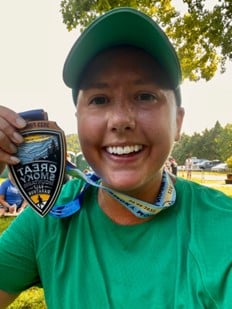
Moving Forward as a Cancer Survivor
Now cancer-free for just over a year, Carly is focused on her life as a survivor and how she can use her own experience to help others navigate a similar diagnosis.
“I think it’s tempting to say that survivorship is moving on with your life, but that’s not it exactly. Whether you are ‘cancer-free’ or still going through it, it’s now part of your life forever, part of your lived experience,” said Carly. “To me, survivorship is about owning your experience and learning how to assimilate this experience you’ve just had with cancer into your life and into your life story. It’s also about taking time to reflect on what you’ve learned from having cancer and taking time to be thankful for those who helped you, to be thankful for your body’s healing, and to be thankful for the wonders of modern medical science. That’s what I’m continually wowed by.”
Carly has even taken to TikTok to document her lymphoma experience, sharing equal parts information, inspiration, and humor. While she never thought she would be sharing something as personal as her lymphoma journey on such a public platform, her channel has reached patients, survivors, and caregivers who have benefited from the content.
“I’m so grateful for the treatment and support I received, and it makes me want to give back to the greater lymphoma community.”
Read More Articles from Pulse
Pulse is a publication of the Lymphoma Research Foundation, providing the latest updates on the Foundation and its focus on lymphoma and chronic lymphocytic leukemia (CLL) research, awareness, and education
